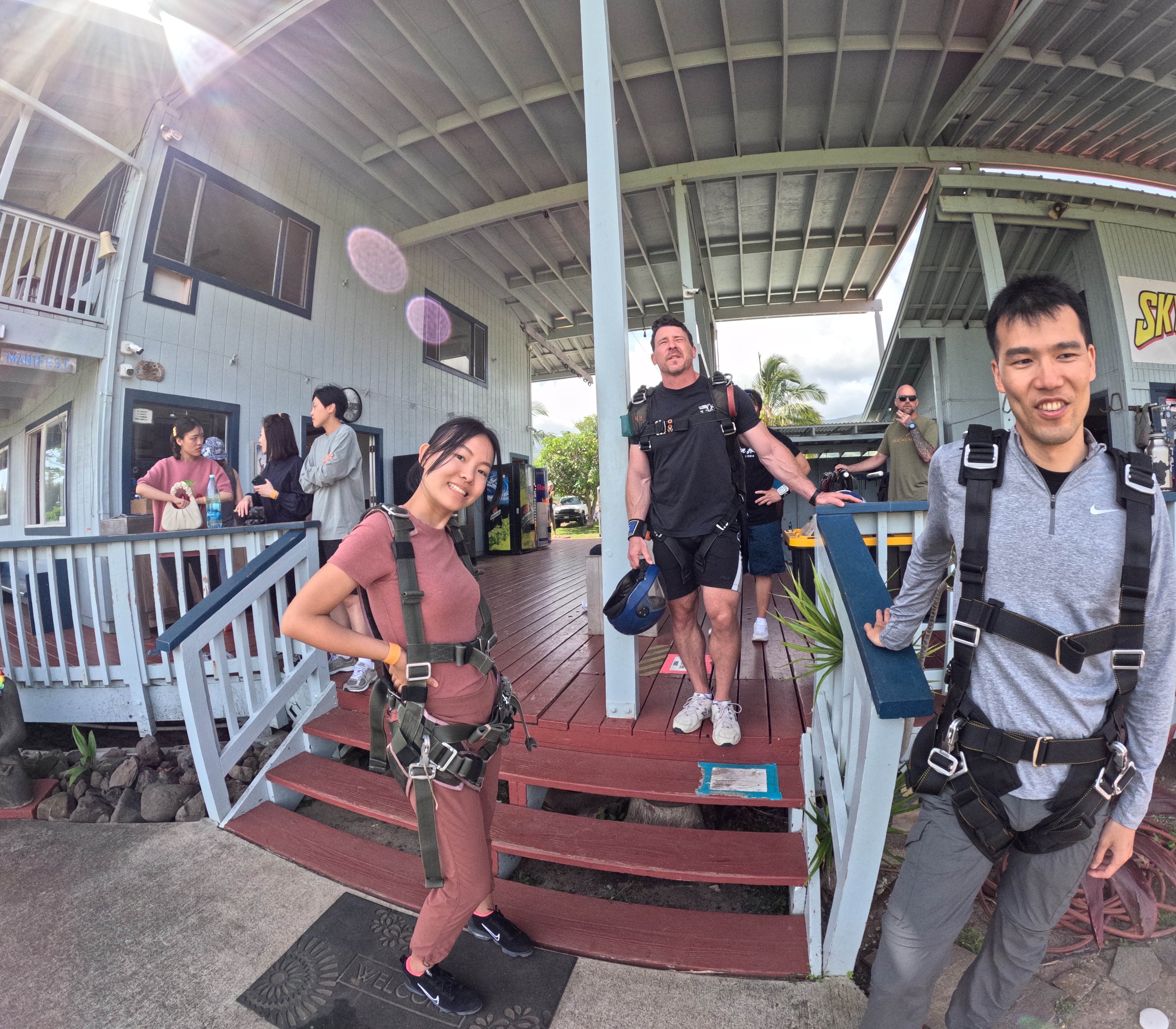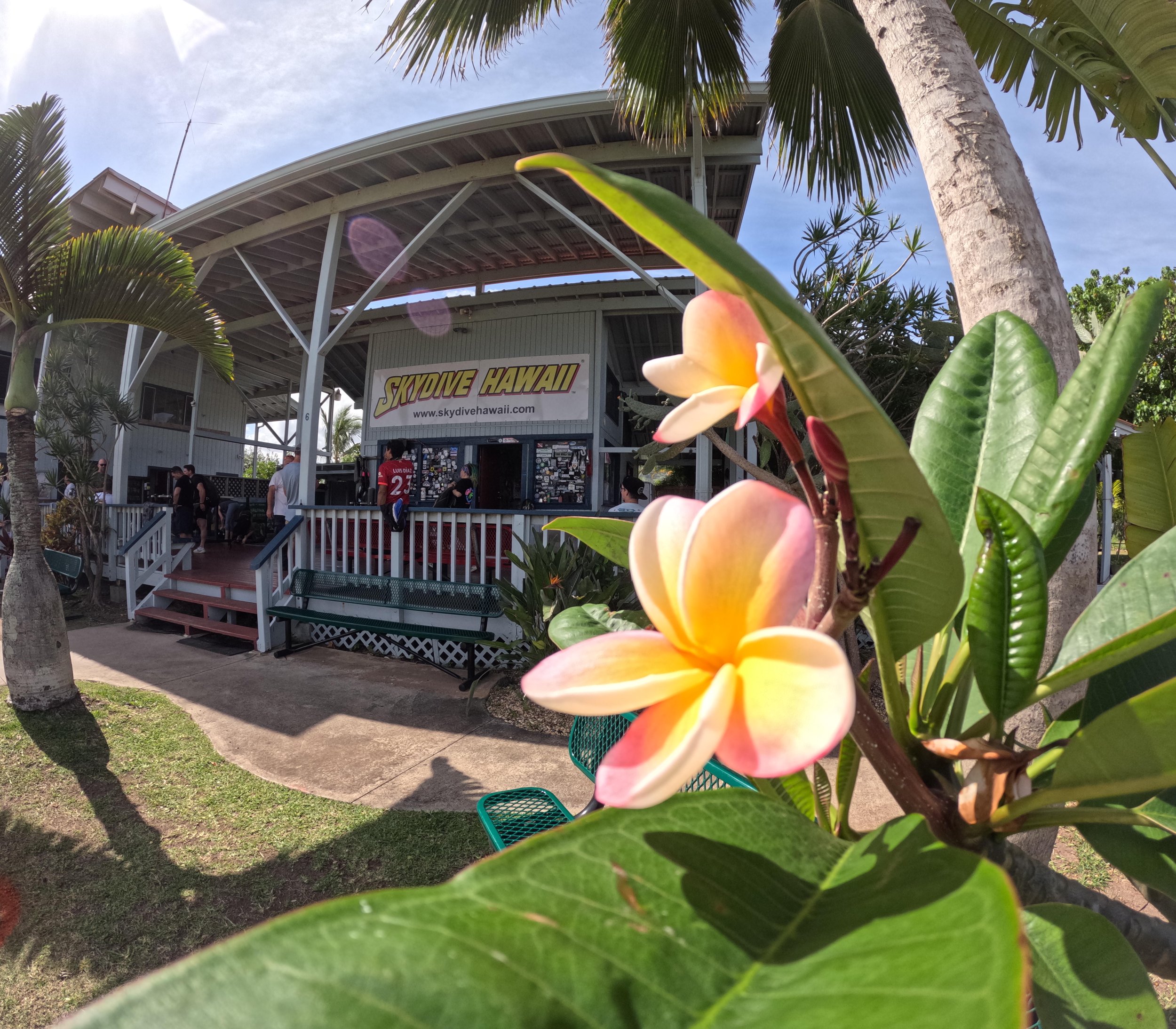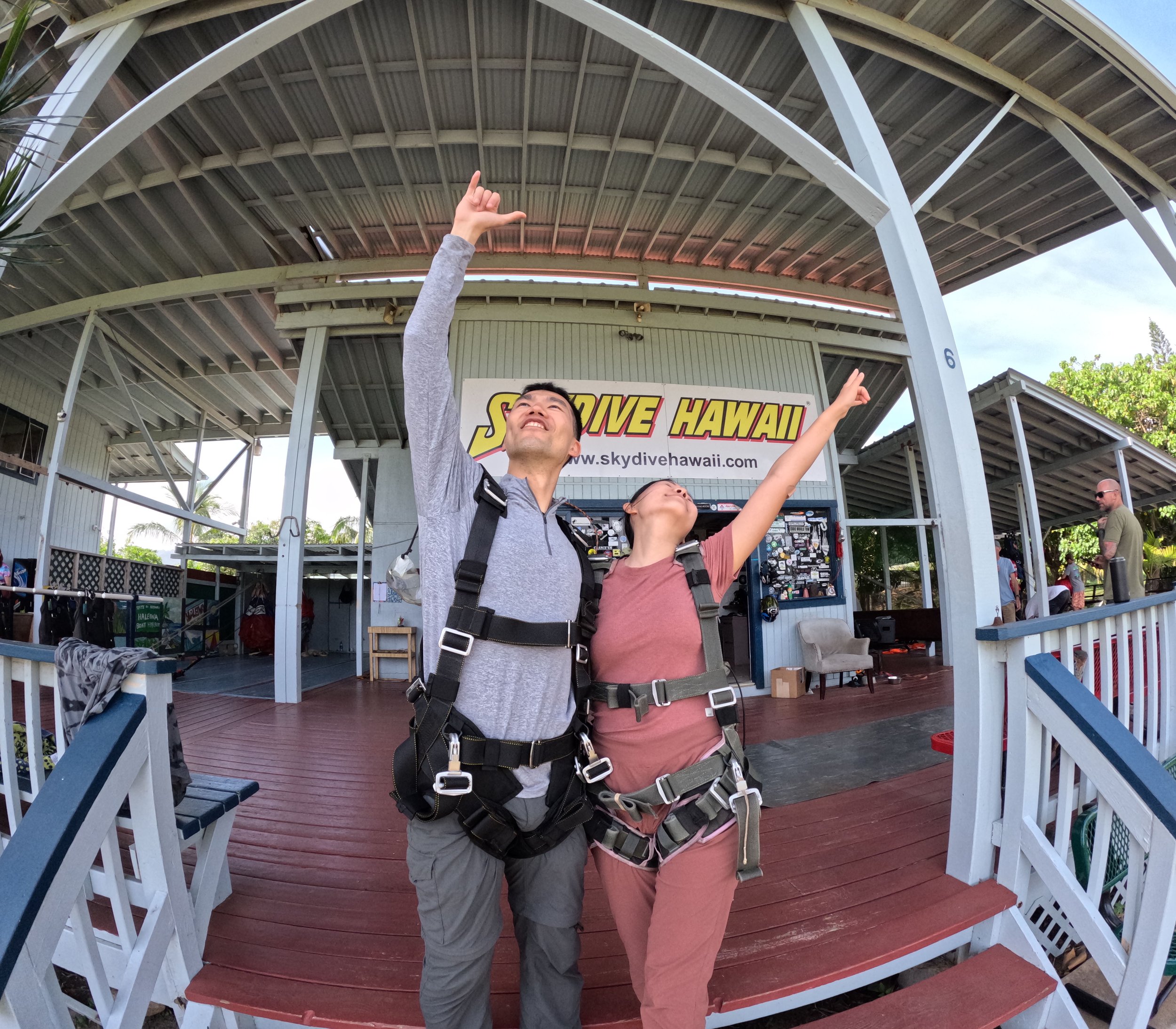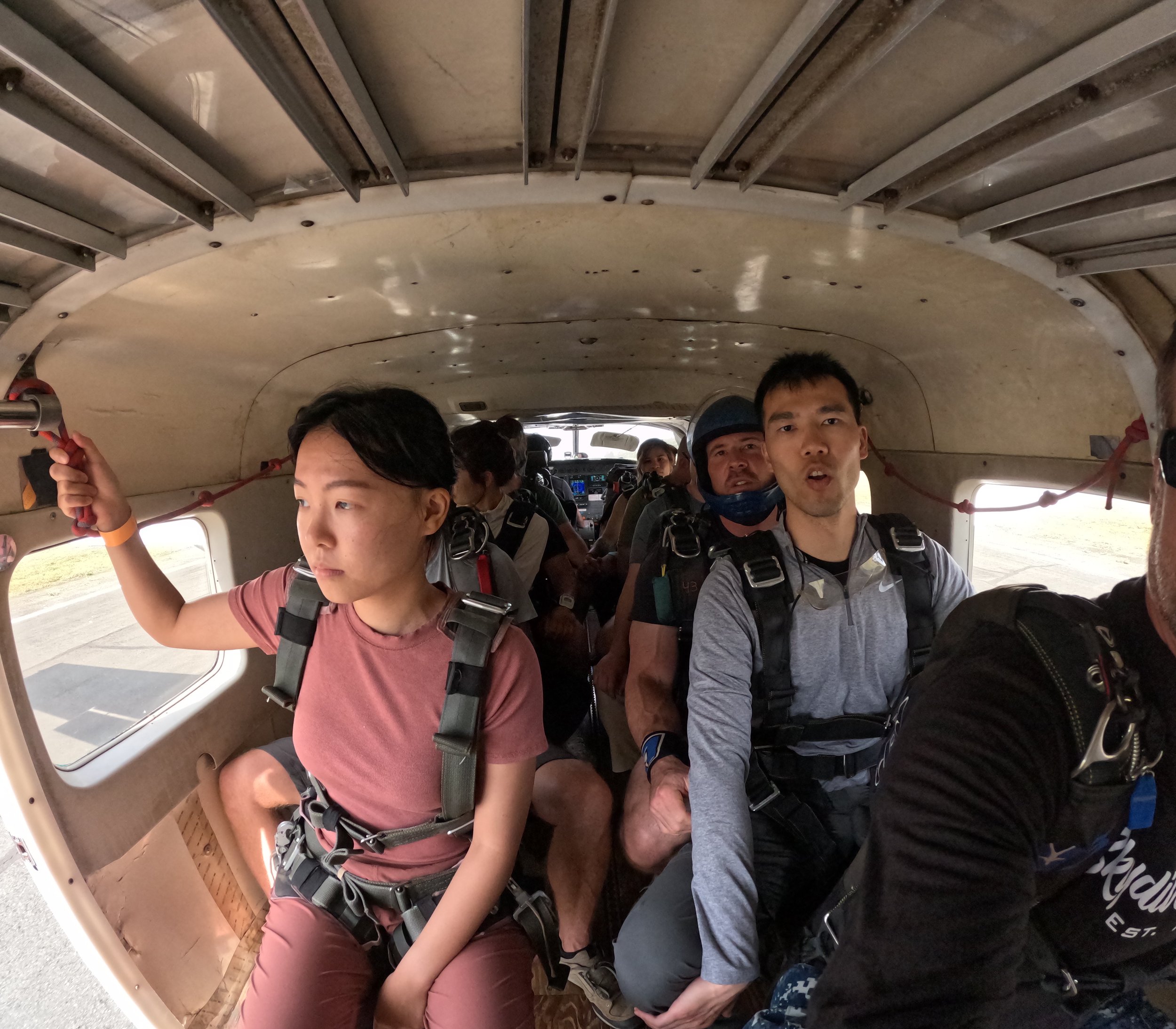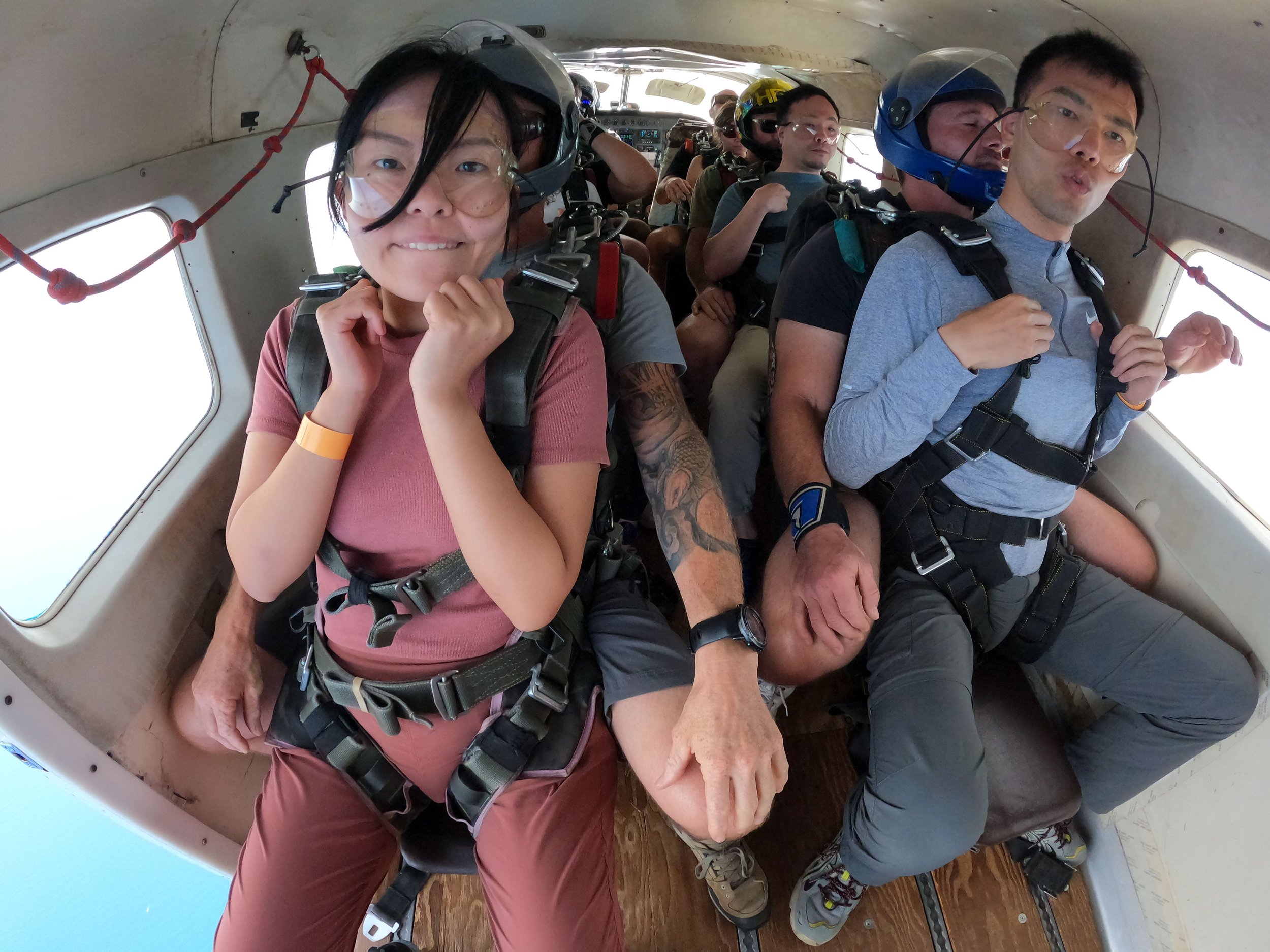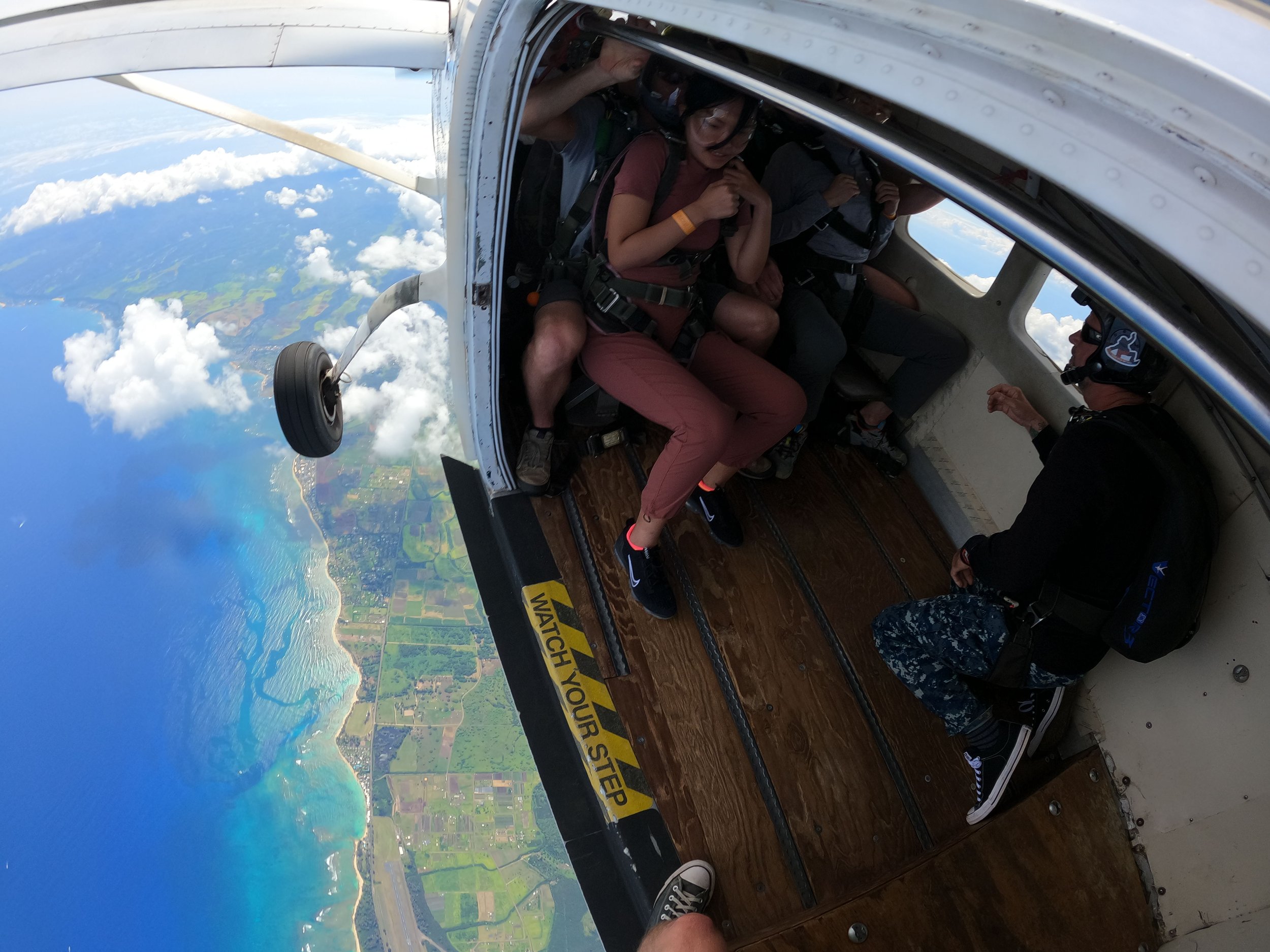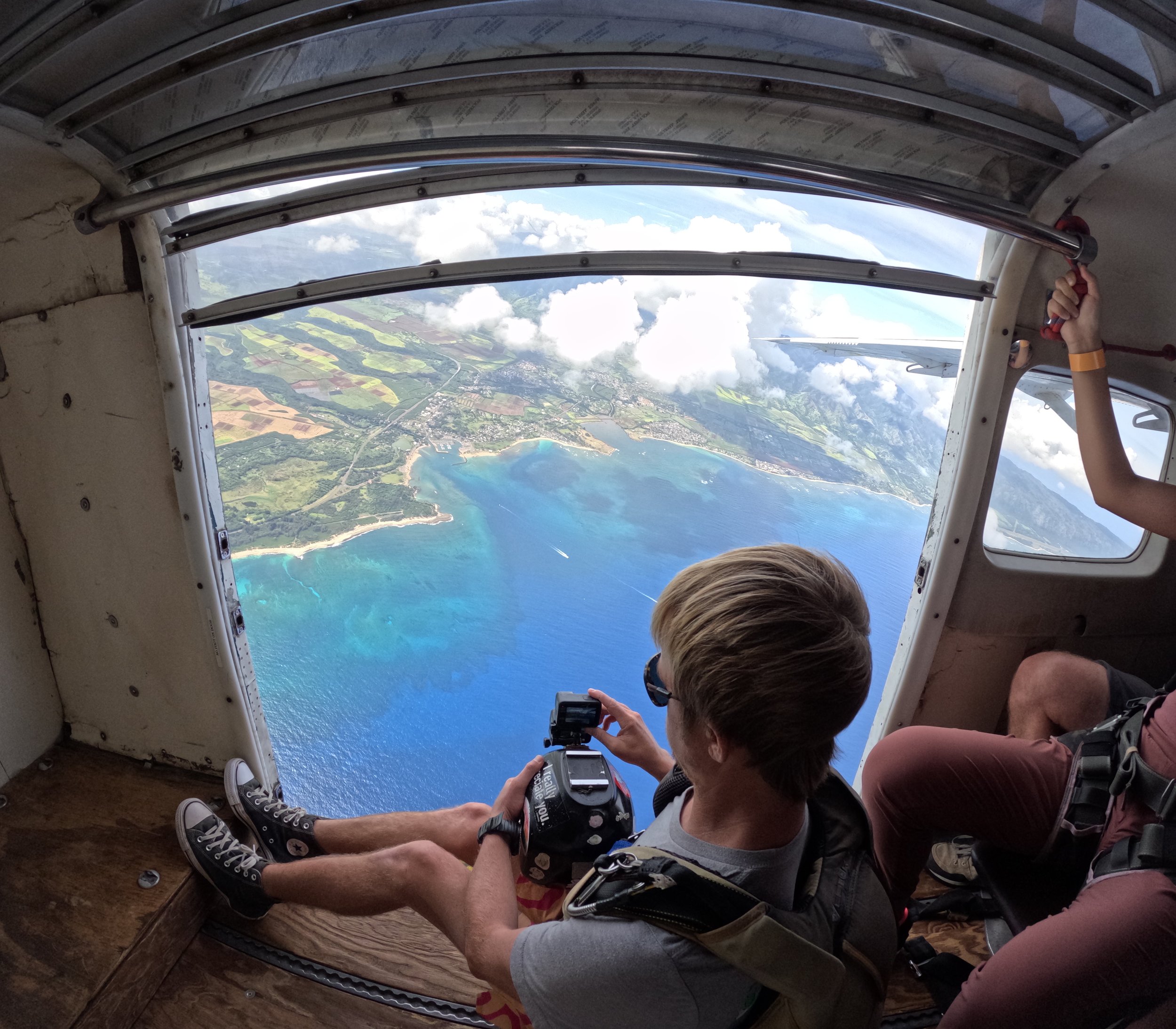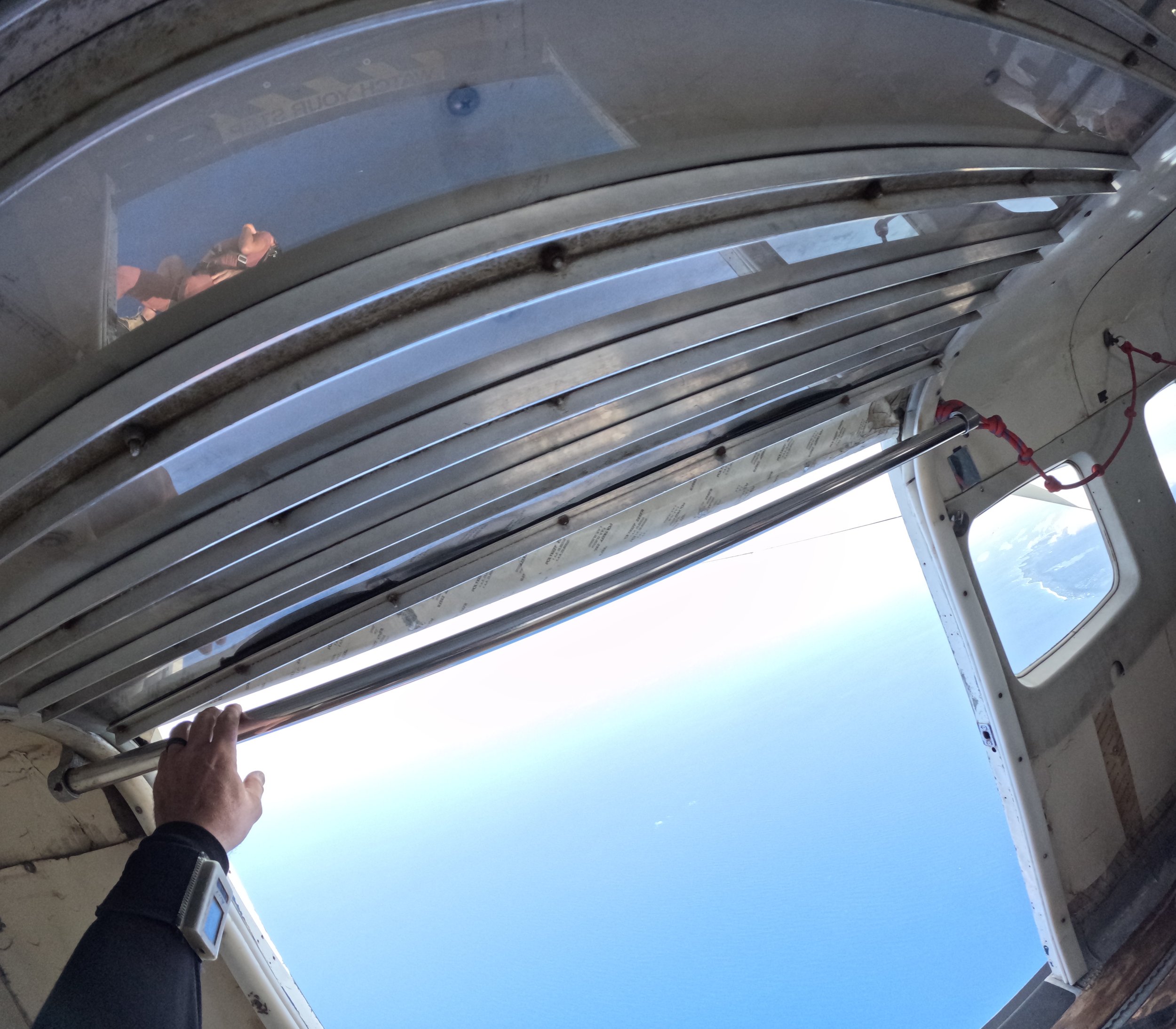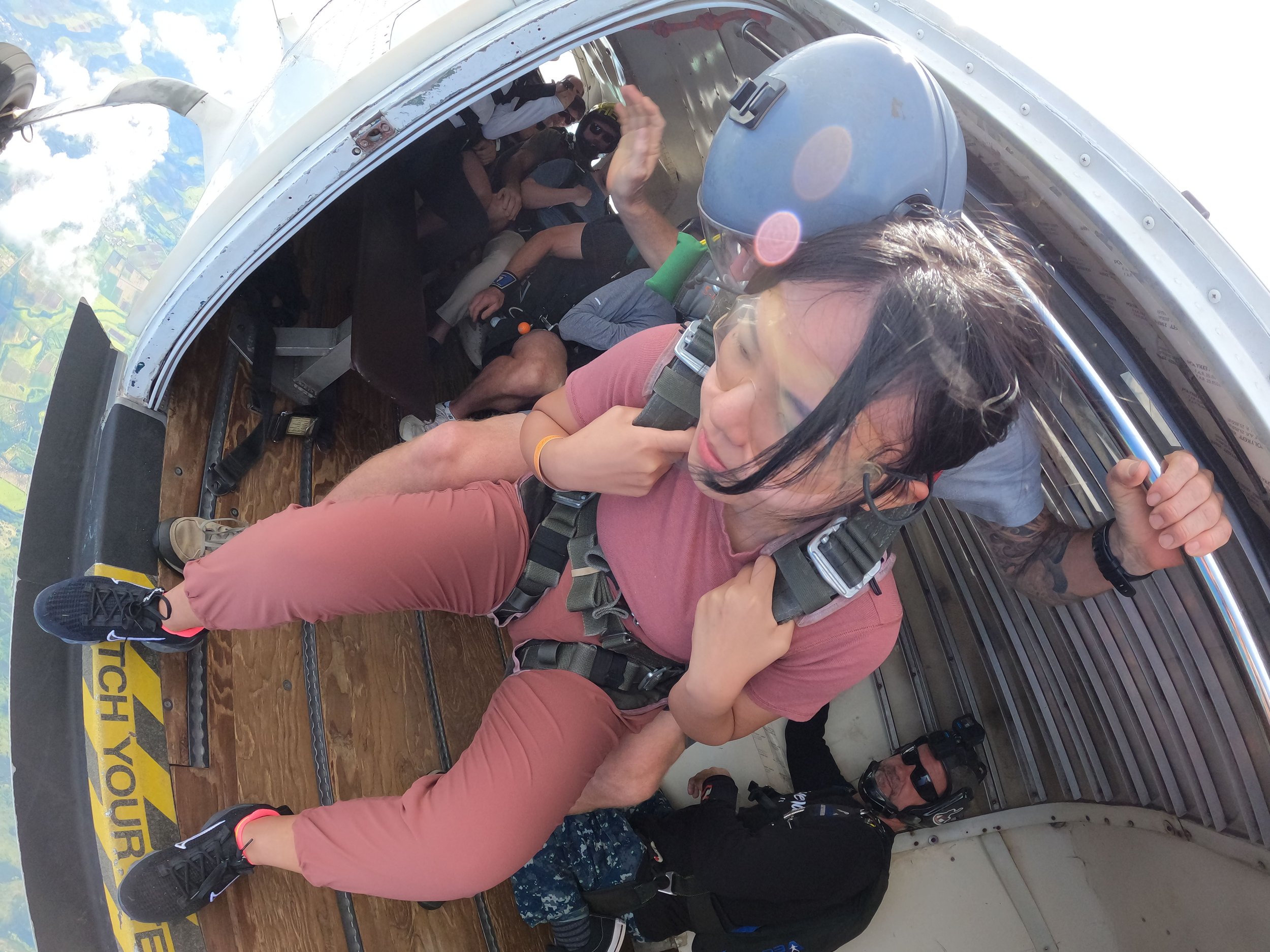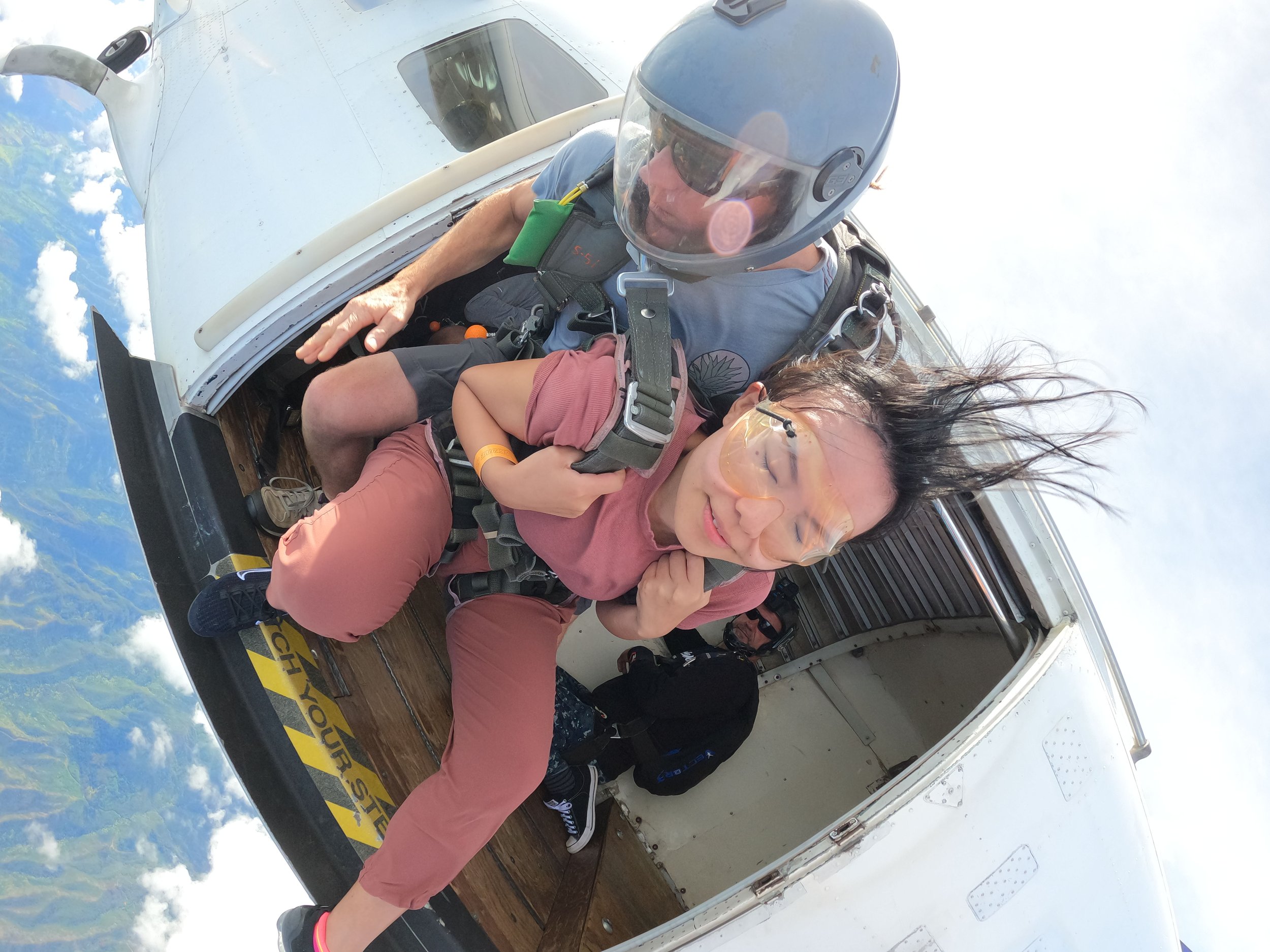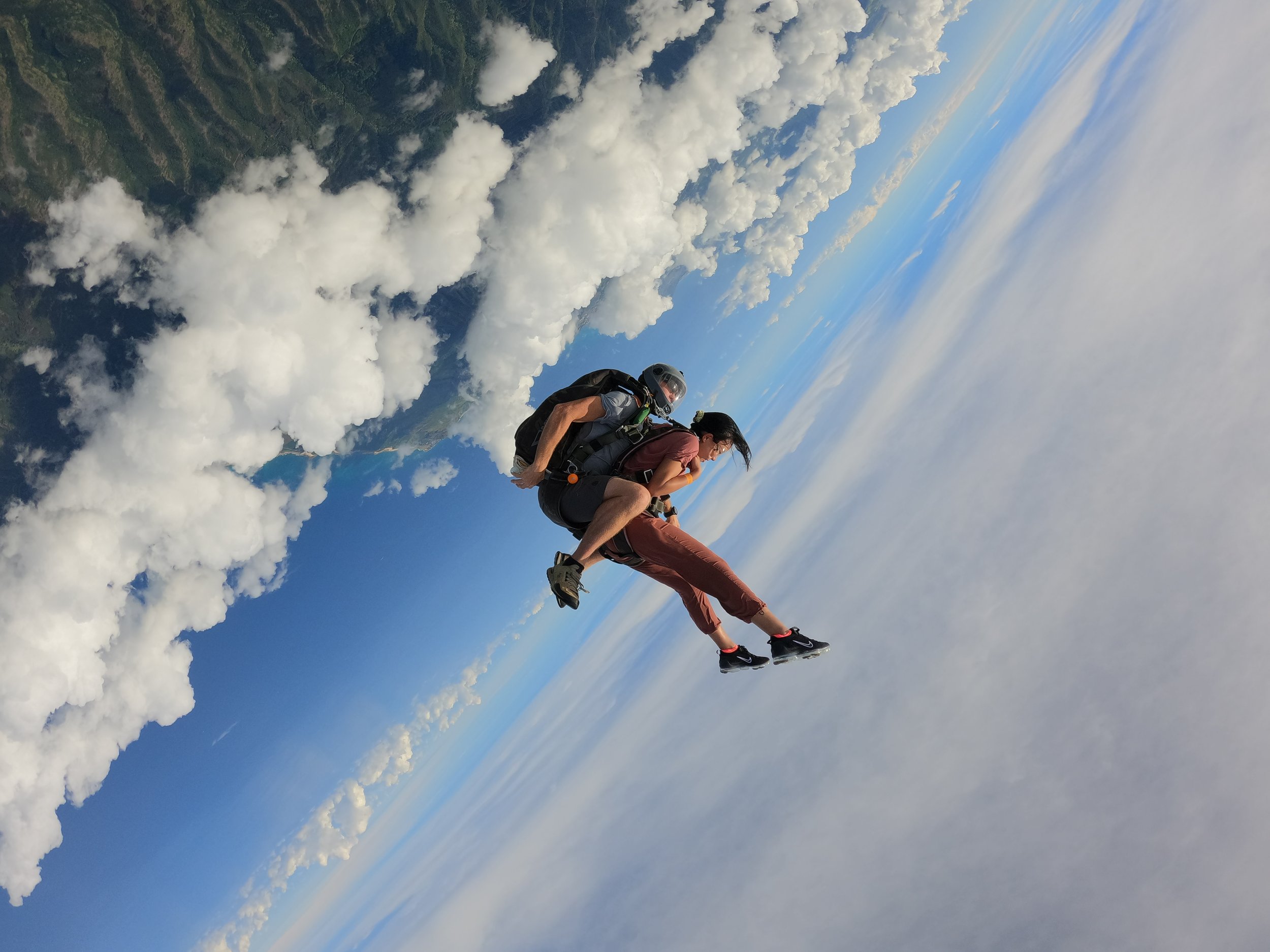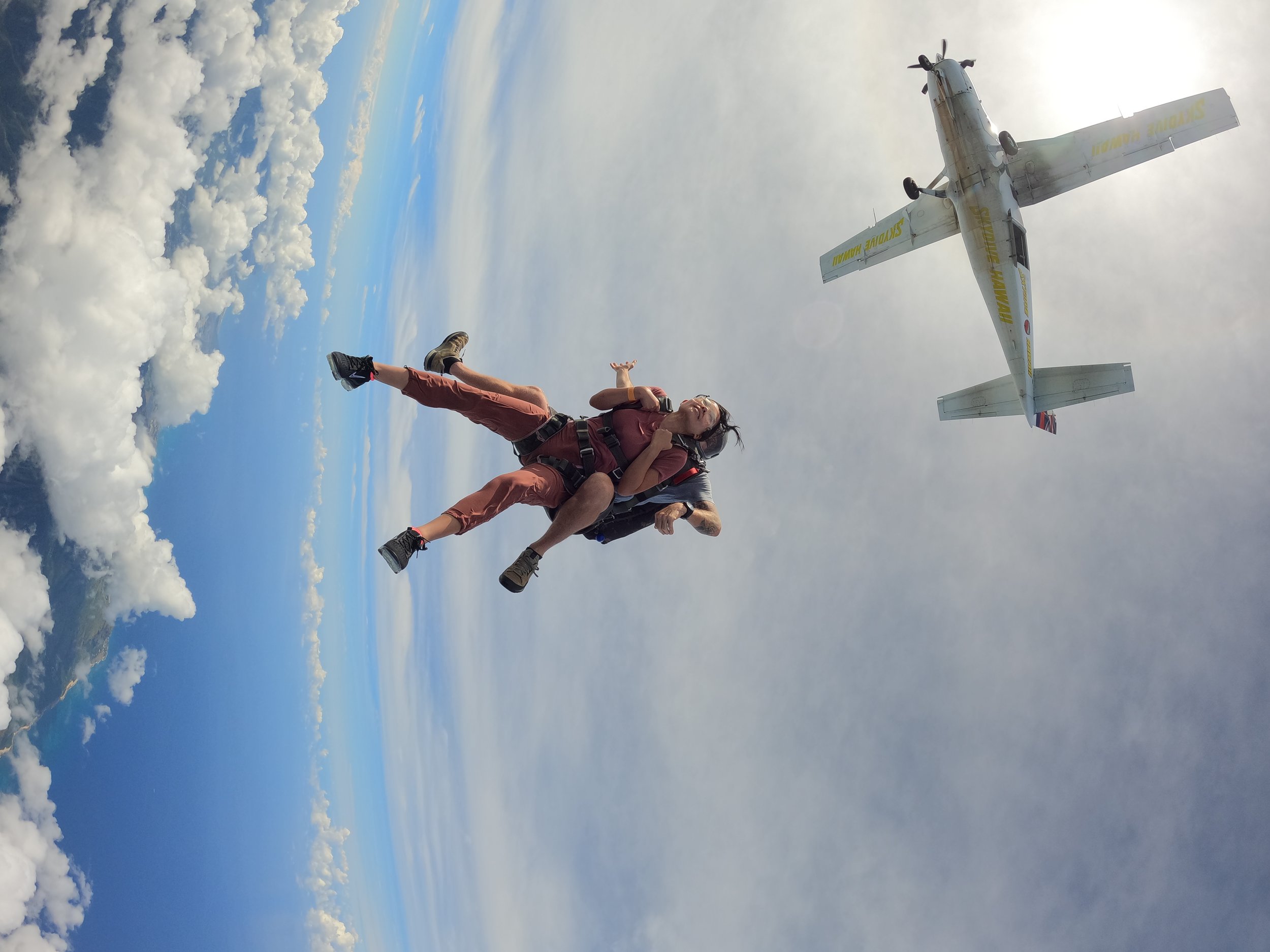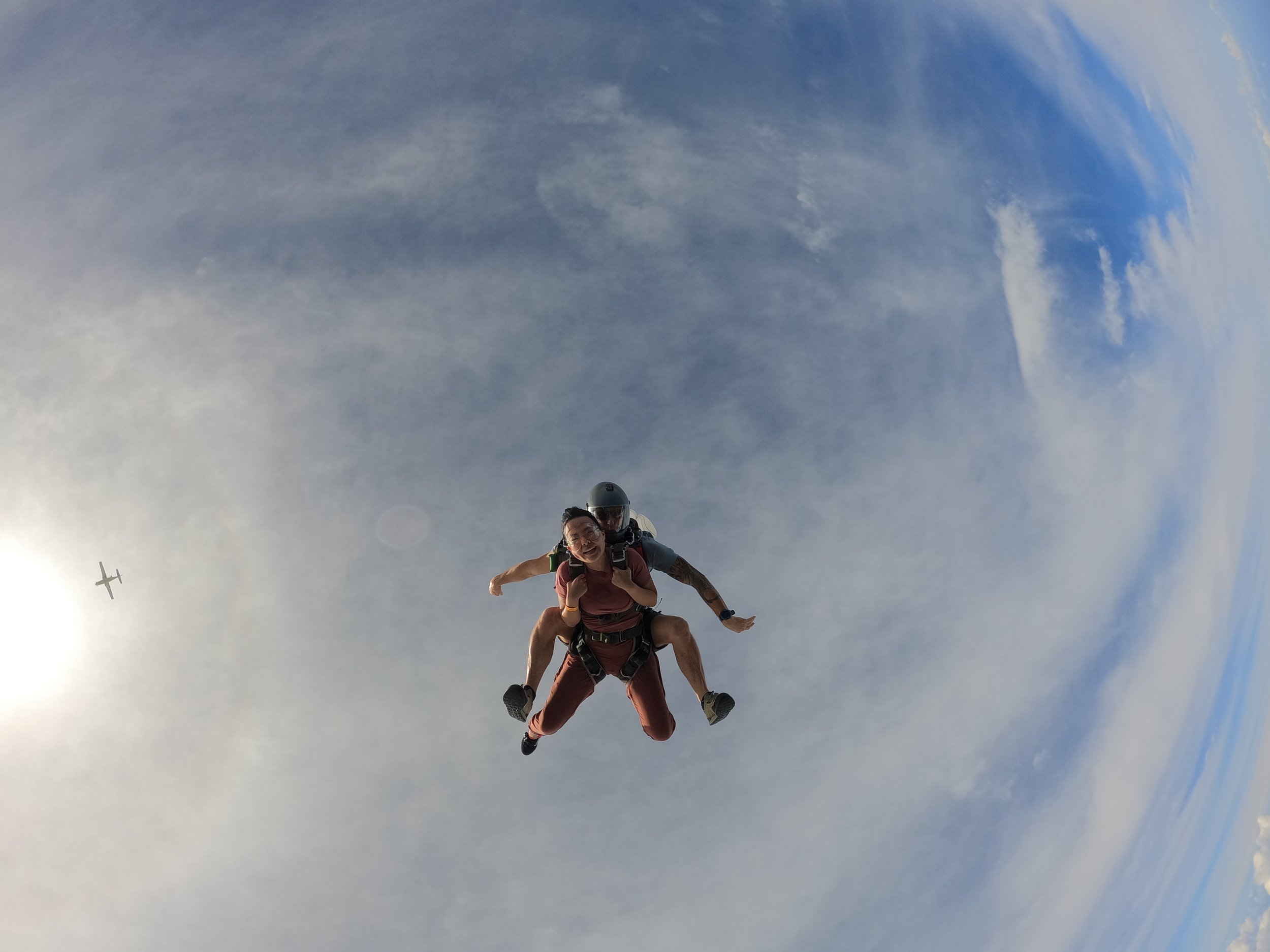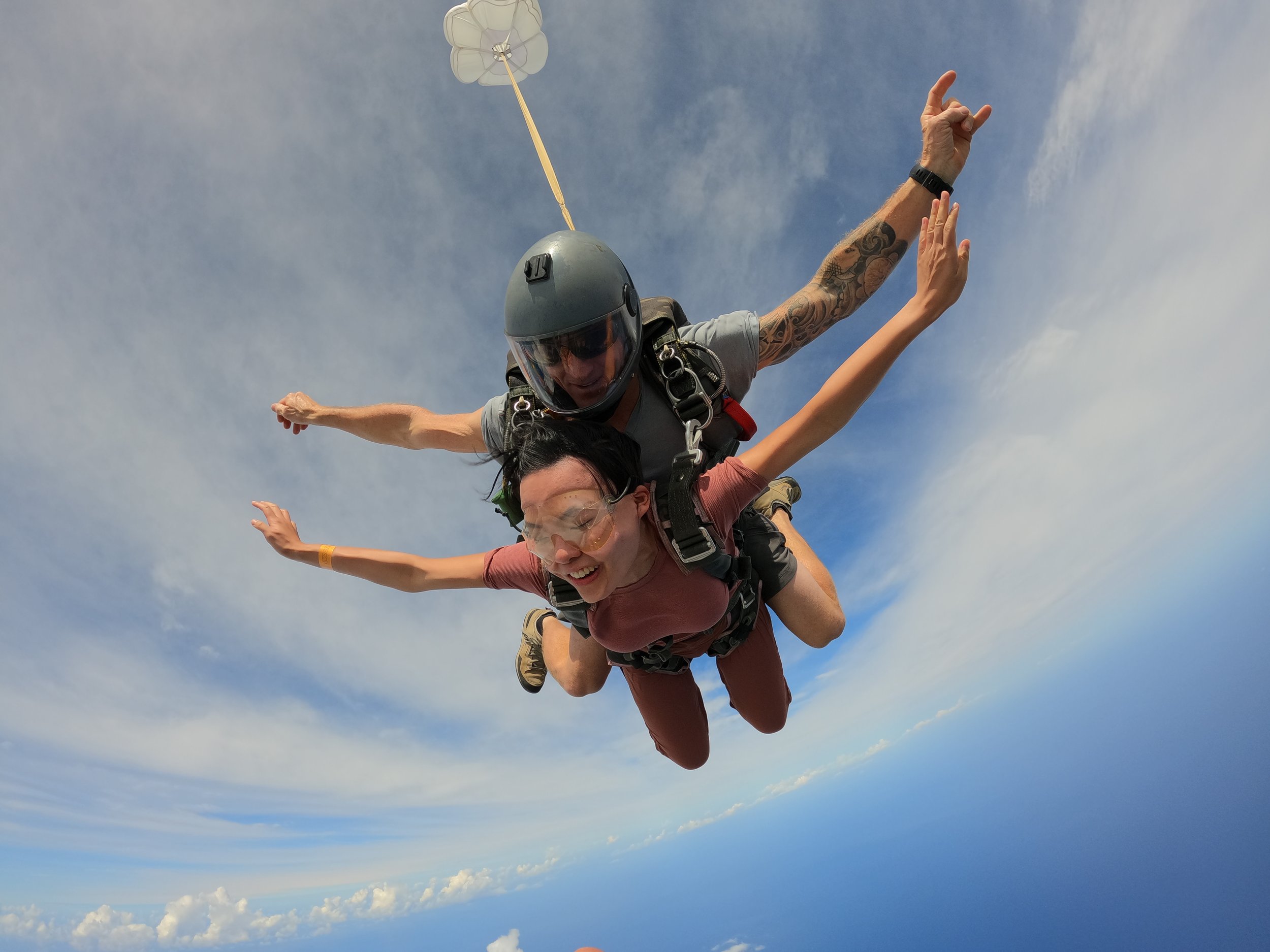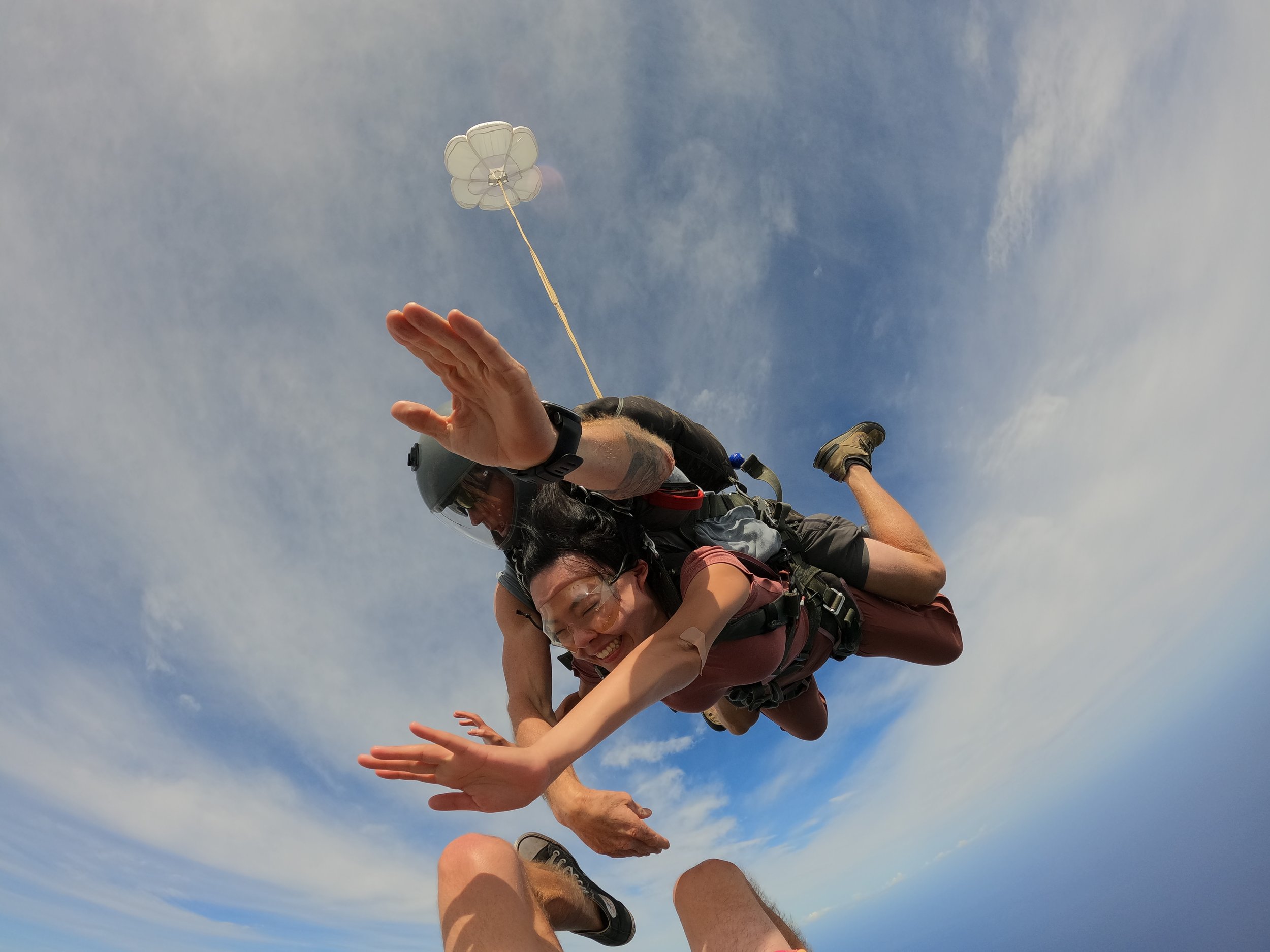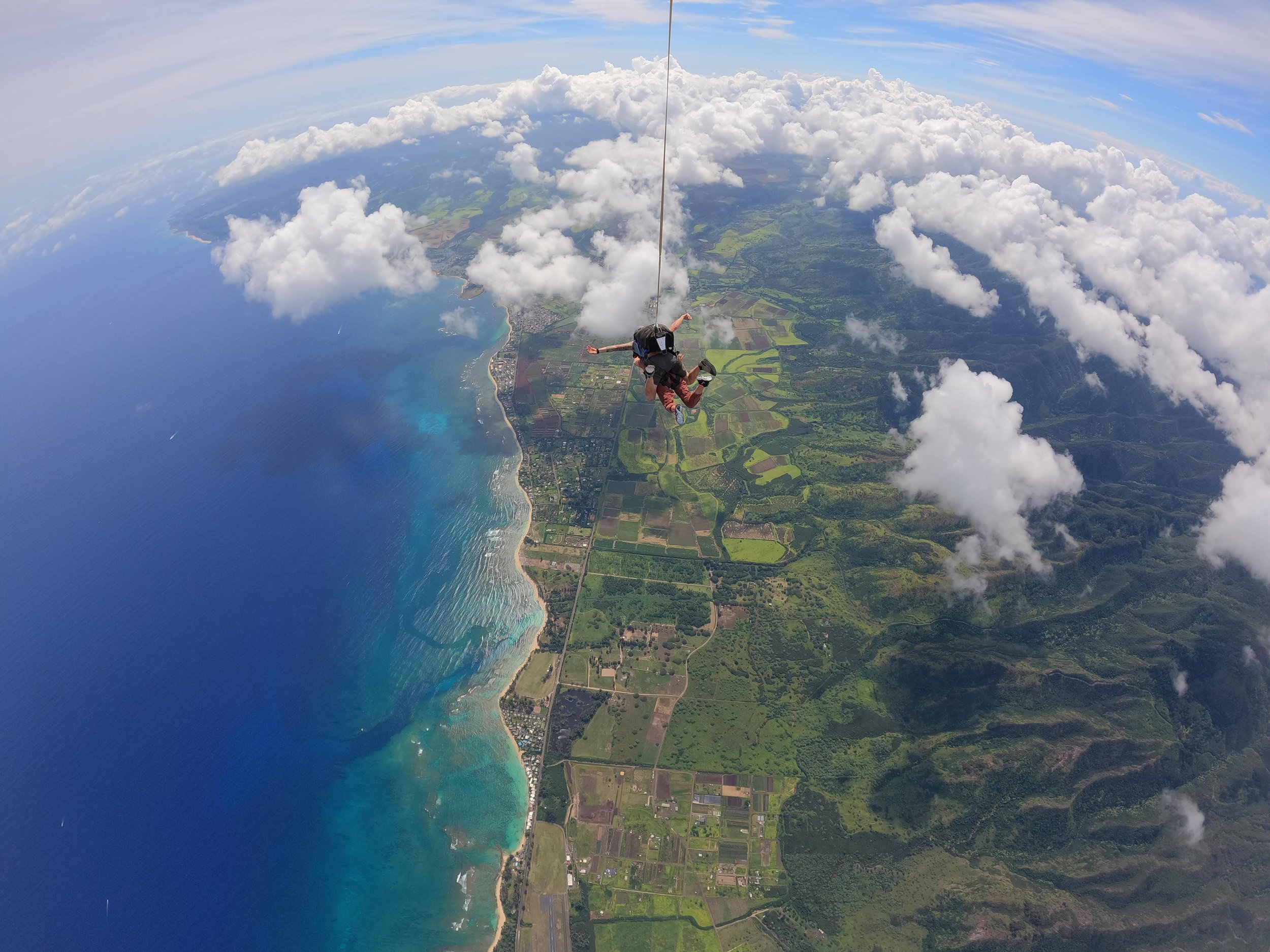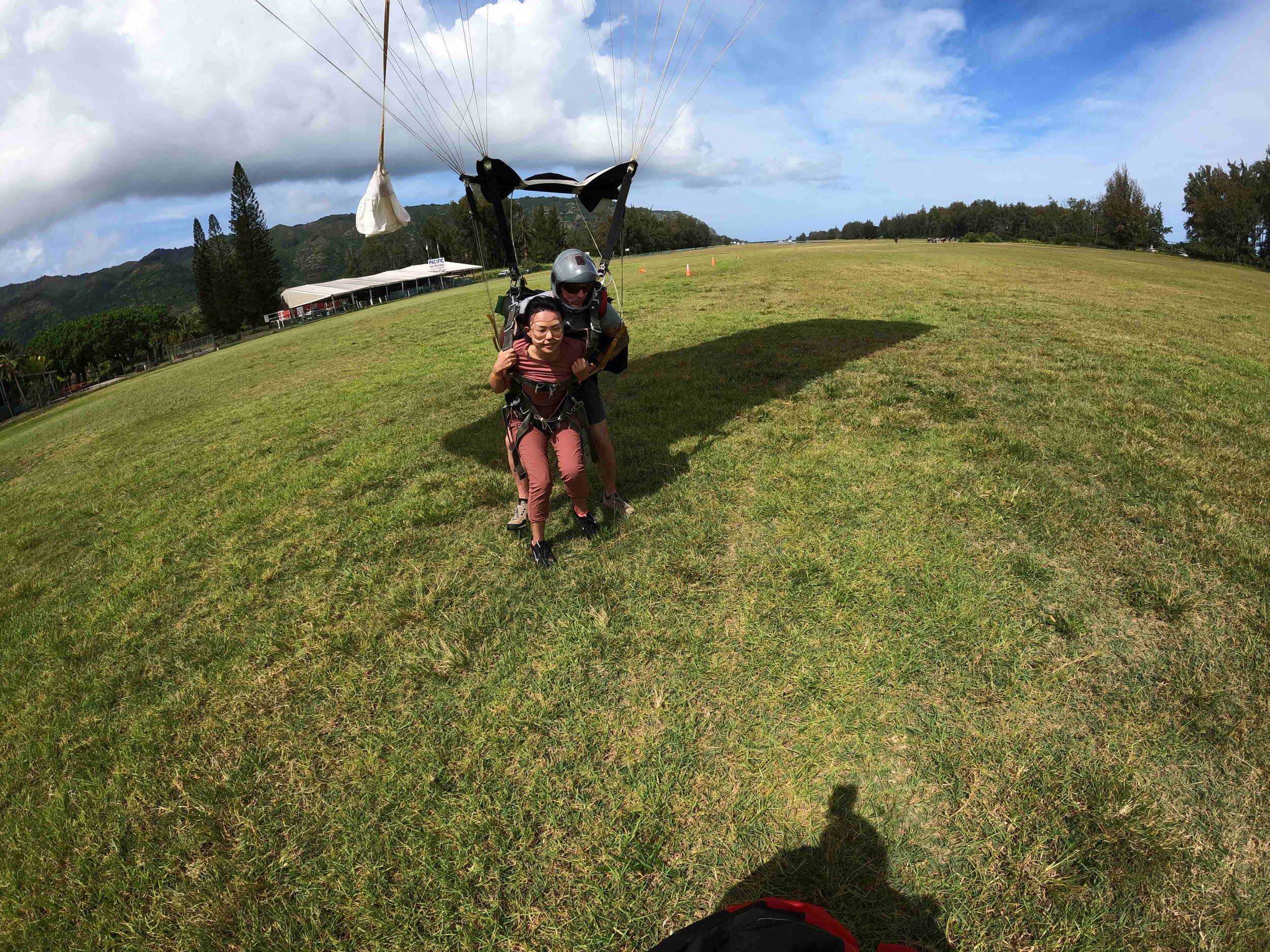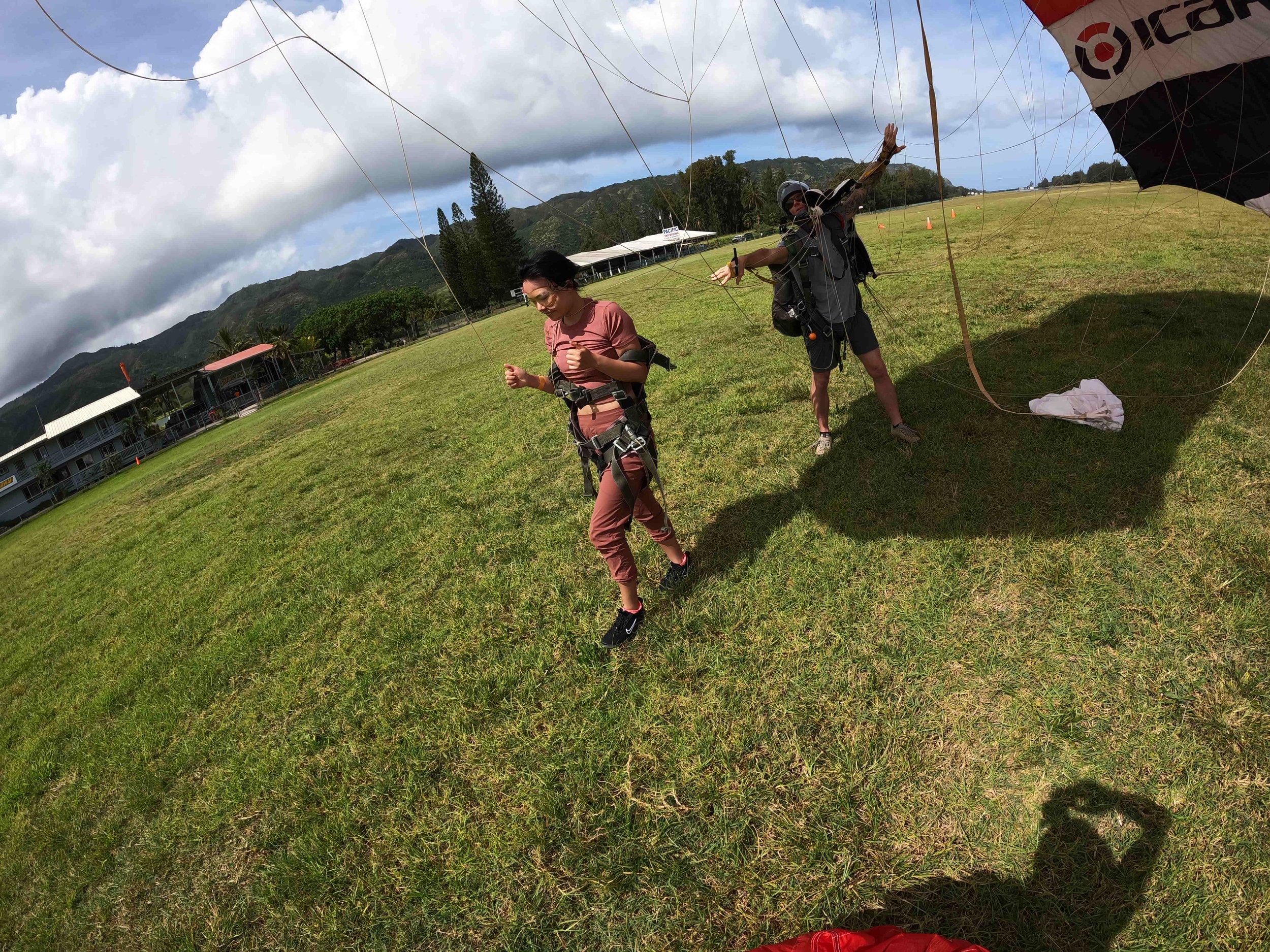Happy (Tandem) Skydiving, April 17
Note: I originally wrote this piece in Chinese. I asked ChatGPT for help to translate my writing into English, and then I made edits in every sentence (to clarify, while also continue to create). Please enjoy our collaboration.🪂
🪂
Tandem Skydiving, a form of skydiving invented by two men 40 years ago, allows those without much adventure spirit or in-air skills to experience the thrill of the sport. On the last day of my Hawaii trip last week, I mustered the courage given by my friend and joined Mr. Bao in signing up for the activity. After the fact, it turned out that as a participant in Tandem Skydiving, all I had to do was board the plane, be strapped to the coach, smile for the camera, and follow the instructor’s sign to retract my legs when close to the ground and before extending them to start walking and finally landing. The entire process took about 15 minutes, including a 10-minute plane ride, followed by a 3-4 minute free fall from a height of 4000 meters before the parachute was opened to help us slow down and land safely.
Danger Index and Fear Index
According to the waiver we signed, skydiving is very dangerous, as the waiver repeatedly reminds us of the terrifying nature of skydiving: "Skydiving is a dangerous activity. You may be seriously injured or killed." Unlike typical sales tactics, the company seems to be protecting itself by clearly stating all risks, giving you the chance to withdraw now if you're not ready. If you change your mind and refuse to jump after boarding the plane, you are allowed to but will not be refunded. According to some data I googled, the death rate for Tandem Skydiving is 0.0002%, which is about 70 times lower than the death rate for driving. According to what my partner Bao looked up a few days before, a major accident once occurred during the takeoff of the plane that caused casualties, rather than skydiving itself.
Before boarding the plane, everyone had a few minutes to interact and chat with the coach, aka “tandem instructor” who will take them skydiving, establishing trust I assume. I expressed my nervousness to my instructor, Jake. I told him hoped to overcome this fear by coming back safely. Jake said that humans always overthink things and that skydiving is not dangerous. "I've been skydiving for 20 years and haven't died yet," he said. He then taught me how to tuck my legs when landing, which was the only thing he specified. Then, the photographer came over to shoot a few short videos of me. I glanced at my partner on the other side, who was practicing a hand-opening movement with his coach, which my coach did not instruct me to do.
Amidst my nervousness, I saw the previous batch of skydiving student tourists returning to the grassy field beside us one by one. Watching them elegantly glide back to the warm grass, I felt more at ease.
Finally, it was our turn to go to the runway.
The Most Stunning Flight
There were probably five groups of parachute “students and instructor” pairs who boarded the plane including us. Rather than calling them "students," I would prefer to call myself an "experiencer" or "tourist." After all, I wasn’t there to practice how to jump out of a plane. At most, I was just a paying tourist who was only concerned about coming back, alive. As Jake and I walked towards the plane, I asked the coach if I should be concerned about the part where we opened our hands in the air that I saw the other instructors telling their students to do at some point, and he said it wasn’t part of his plan. He wanted me to focus on the “key things,” which were to relax and keep smiling, and he would remind me to tuck in my legs during landing. I said no problem.
The plane that took us into the high sky was very small. I walked up three or four steps from the runway to get into the belly of the plane, surrounded by the strong smell of gas. After three groups of students and coaches boarded, the plane was already full. Bao and I were the last ones to board the plane and happened to sit on the left and right sides of the front row. Two photographers sat directly on the ground in front of me, next to the unobstructed cabin door. Then they fastened their safety belts that extended from the corner of the cabin like how I do that in my car without much thinking. Jake sat tightly behind me, having his safety vest and mine tied together.
I was sitting in the front row, with the wide cabin door right in front of me to my right. From this point of view, I almost feel like I was floating in the air without the plane. It must be what Rose feels on the tip of Titanic on that rail. During the entire takeoff, the cabin door remained open. I was scared at first but then started thinking: everybody on this plan either has a parachute on their back or is tied to a professional skydiver. We should be the safest people on any airplane.
I had never seen such a dreamy blue sea before. While taking deep breaths to calm myself down, I tried to imprint this magical scene in my mind. Every second I was telling myself: we are already high enough. Is the coach going to stand up any second and jump out of the plane (with me)?
In the meantime, the temperature got lower by the second.
The skydiving photographer...
Let me spend a few seconds talking about the two skydiving photographers sitting in front of me. They were actually there so that they could take pictures of me and Bao respectively. I only found out shortly before boarding the plane that the fact we had paid extra for the photography service during the skydiving reservation meant an extra skydiving professional was going to skydive. The company specially assigned these two photographers to jump with us. Their task was to jump with us and take pictures of us during freefall.
The plane continued to fly for five or six minutes, and more came into view. Besides water, there was also this long coastline. There were the blue ocean, green trees, red soil, and white clouds. The colors were so rich. I felt like I was chained to the slow buildup, the uphill process of a roller coaster, and it was the most challenging part. When will the roller coaster finally reach the highest point and then rush down?
My instructor Jake did a final check on our binding safety belts.
Preparing to Leave the Ground (of the Plane)
Jake nodded and moved a bit. We gave each other a thumbs-up. I knew he was implying that we were ready to leave the plane. He stood up, holding onto the nearby handrail, and I was lifted up with him. To be honest, I don't even remember if I walked out myself or if he did all the heavy lifting of walking me out. We were the group closest to the exit door, so the minimum number of steps allowed us to step directly into the sky.
What surprised me was that during the free fall, I didn't feel the same weightlessness in my chest that I experienced when riding a roller coaster, pirate ship, or turbo drop machines (small ones only, as I'm too scared for the big ones). Instead, I felt like I was struggling to fall down, fighting through the wind in order to drop further toward the ground. As I spun around, I saw the photographer, Will show up in stop motion in front of me, and I tried my very best to smile! With Jake’s help, I even high-fived Will in mid-air. It was such a surreal feeling! After a while, I felt the wind on my face getting stronger and stronger, with a strong resistance; my mouth was constantly filled with air, but I couldn't close it. The photos taken during that time must be hilarious (my friend told me later that I should never have opened my mouth, an important tip). At the same time, the pressure on both ears was immense, and I felt like my eardrums were about to burst. I thought of my partner Bao who easily gets uncomfortable on planes, and he must be feeling even worse! Jake said that sniffing my nose would help relieve the pressure.
After a while, I felt the parachute being deployed because we slowed down a bit, the wind was no longer pouring into my mouth, and my ears no longer hurt. I could stop worrying about the parachute not opening. Instead, I started feeling motion sickness, like I was on a boat in the waves. "Don't get sick on me," Jake said.
Returning to the warm and humid land
The parachute helped us slow down further. Swaying left and right, we returned to the familiar grassland, ready to touch down with our feet. Following Jake’s instruction, I lifted my legs to avoid injuring myself when touching down at high speed. When he finally told me I could stand up and start walking, I extended my legs and took a few steps to steady myself. The ground was so warm and humid compared to the high altitude. It was even a bit too warm. The parachute gradually deflated and the ropes softly fell on us. I peeled myself away from the threads and saw that Will the photographer had already returned and already started snapping pictures of me again. Another pair of students and their instructor were approaching, but they seemed to have coordination issues and fell to the ground during landing. They were laughing so I guess nobody was injured. I looked up at the sky again and saw that my partner was also returning.
The feeling of nausea hadn't left me, and I felt disappointed in myself. But I knew that time was all that was needed for situations like this. Jake came over and asked me to sit on a bench. He turned on the water pipe next to us, asked me to take off my shoes and socks, and ran water on my hands and feet. He said this would help cool down my body and relieve the sickness.
While we rested and took off our gear, Jake printed and signed my "skydiving certificate". I never thought such a thing existed. We returned to the small building where we had signed the waiver earlier, ready to pay the remainder of the fee (we had only paid a deposit). Bao and I asked the staff how to receive the photos taken by Will and Knox (Bao’s photographer). The staff said that although we only asked for photos, the photographers had also taken videos. They showed us a "trailer" of the videos to help us decide if we’d buy them too. The TV on the wall started playing, and we watched it with little pressure. It felt great to be back on land.
I saw the arm-tattooed lady who had struggled to get on the plane also return. Her face didn't look too excited. I gave her a smile.
I won't forget you, coach.
Returning to the base, I saw a new group of tourists getting ready to board the plane. Some staff who had just landed were using some bowling-lane-like equipment to tidy up the complex threads. I assumed they were heads down putting away the parachutes that had just been deployed. For a brief second, I felt like I had accomplished a big mission and conquered countless inner doubts, but for these skydiving instructors, it might just mark the completion of a quarter of their daily KPI. I remembered something during skydiving a few minutes earlier as I was falling and appreciating the stunning scenery. I asked Jake in the air: "Do you ever get tired of this view?" I don't remember what he responded specifically, but I felt that when I was asking that question, I was already making myself see the scenery from the perspective of “a job." For me instead, as “the consumer” of skydiving, I suddenly didn't know how to feel about my accomplishment.
Thinking back to the first few minutes when I first met Jake, he asked me what I do for a living. Faced with this question, just like the past few weeks when well-meaning strangers asked me the same question, I always froze before I make up an appropriate answer. After being laid off two months ago, I didn't have a good enough reason to mention the name of my former company in my answer. I even doubted my own profession and industry, and wasn't proud of my title, nor was I sure which title would define me in the future. But I didn't want to make the other person feel awkward for sure, so I always answered with keywords like "someone who sits in front of a computer" or "a product researcher." Unlike seven years ago, when I first came to interact with the UX (user experience) industry, I just wanted to stop someone and share with them this promising, valuable line of work that I wanted to get my foot in the door. I also know that nowadays, people advocate for the idea of "not defining yourself by your job." But as someone who has no skills in professional skydiving, I couldn't help but hypothesizing Jake and all these skydiving instructors’ perspectives about other people’s jobs: aren't all other professions as ordinary as vanilla ice cream?
Thank you, coach. Everyone who hears that I went skydiving praises me for being brave. But I also feel embarrassed because I know I didn't make any effort or breakthroughs. The success of this "tandem skydiving" was based on your skills and experience as a coach, and it was just one of the thousands of times you've done it without any ripples outsiders could pick on. But then again, with your help, I crossed the mountain in my heart, and this can also be a meaningful achievement, right? Because from now on, every time I think back to those moments before you took me to jump out of the plane, my heart and stomach would twitch; I’d feel the nerves, but also flashback to the wonderful nature in front of me, and then I’d feel a moment of relief that I am safe and present. This experience has made me a more complex person, and I have you to thank the most. I wish you well!
now, pics
✨
now, pics ✨
